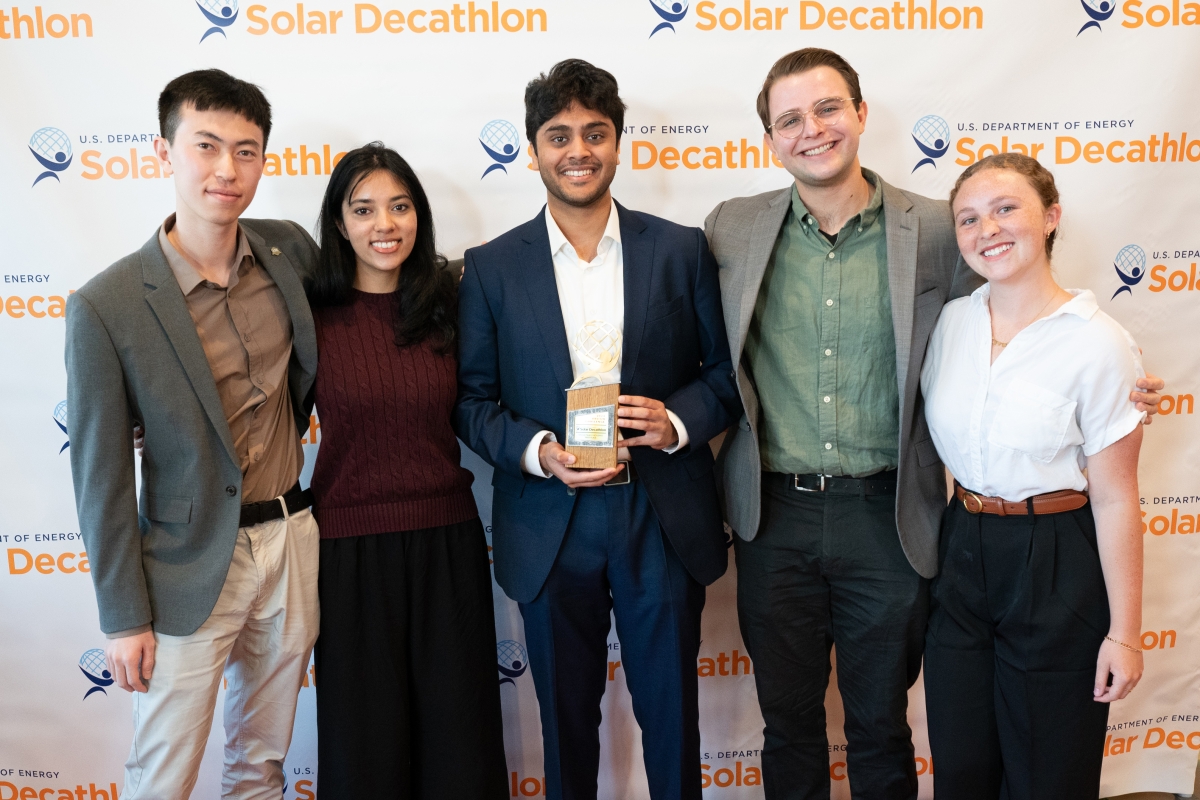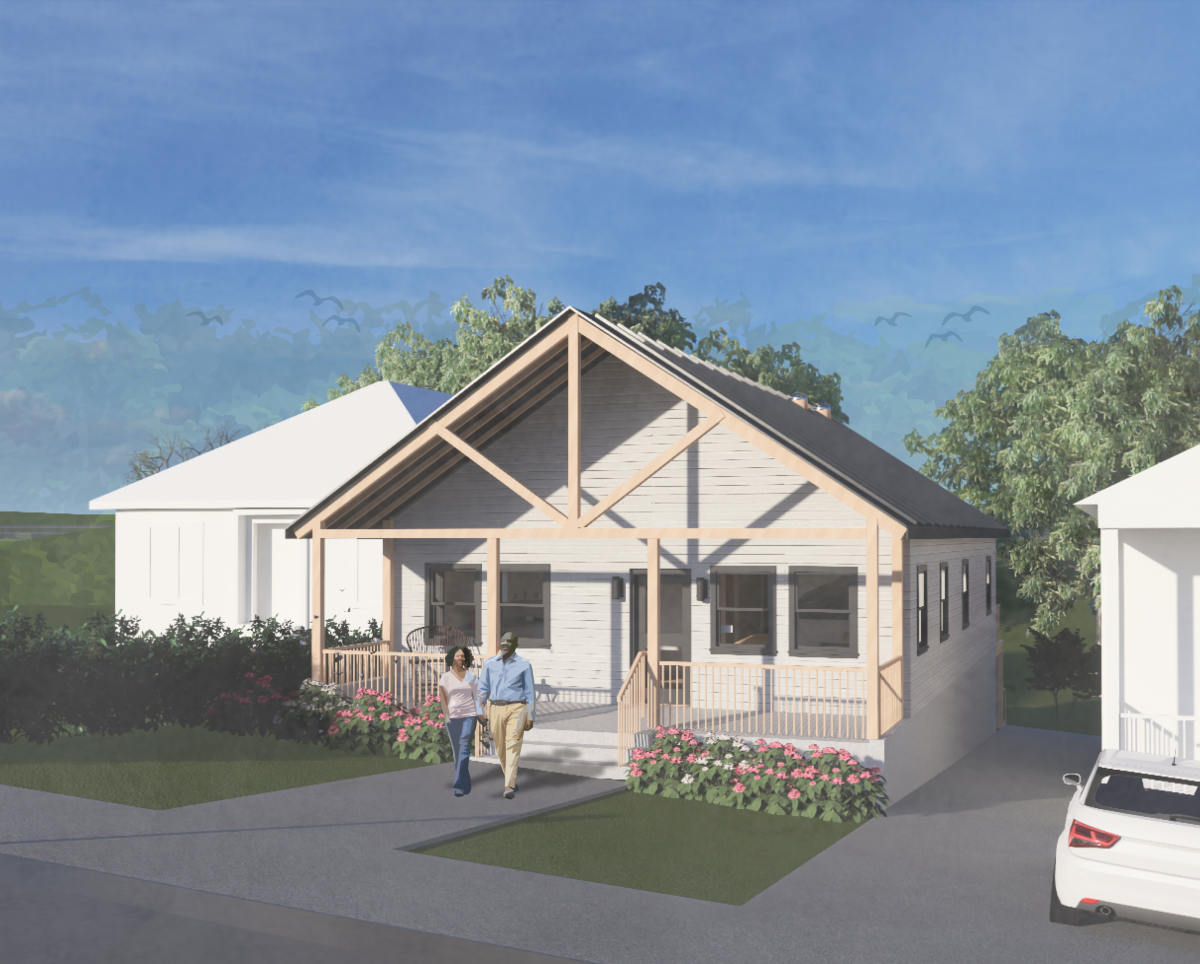With their shared interest in sustainable building practices, civil engineering students Arya Desai and Jackie Zong assembled a new student organization to compete in the U.S. Department of Energy’s annual Solar Decathlon—and won first place in the single-family housing division.
The Solar Decathlon challenges college students from around the world to create innovative, high-performance building designs that address issues related to climate change, affordability, and environmental justice.
Desai, Zong, and other members of their interdisciplinary team traveled to the National Renewable Energy Laboratory in Golden, Colorado, in April to present their concept for an energy-efficient home in Atlanta’s Vine City neighborhood. Out of 10 finalists, the Georgia Tech team was selected as the winner in their division.

From left: Solar Decathlon Georgia Tech team members Jackie Zong, Anushka Kibria, Arya Desai, Wyatt Williams, and Rachel Witherspoon pose with their award.
“As a majority undergrad team with little experience, to be able to pull off something like that was pretty extraordinary,” said Desai, a third-year civil engineering student and co-founder of the group.
The students aren’t resting on their laurels, however. Following their success at the Solar Decathlon competition, the team is spending the summer working on planning and permitting with the goal of beginning construction on the home at the start of the fall semester.
“Now we have another year to actually finish it out and build the house before we graduate,” Desai said. “It’s going to be extremely difficult but we’re hoping we can pull it off.”
Years in the Making
The seeds for Georgia Tech’s Solar Decathlon Team were planted back in 2021. During their first year at Tech, Zong and Desai met in the “Exploring CEE” class, which provides a broad overview of civil and environmental engineering topics.
They found they had a lot in common and went on to become active students, both joining Georgia Tech’s chapter of the American Society of Civil Engineers (ASCE).
In the summer of 2023, Zong and Desai were part of a team that won the national Sustainable Solutions Competition at the ASCE Civil Engineering Student Championships.

A rendering of the house designed by the Solar Decathlon Georgia Tech team.
Following that experience, they decided it was time for a new challenge.
“We are both passionate about sustainability in the built environment,” Zong said. “That's why we decided to participate in the [Department of Energy] Solar Decathlon competition.”
That summer, they began making plans to create a Georgia Tech team to compete in the annual event. At the start of the fall semester, they began recruiting and ended up with 15 members from a mix of majors including architecture, civil and environmental engineering, building construction, and business. Zong and Desai rounded out their organization’s leadership team with the addition of Rachel Witherspoon, a master’s student in the School of Architecture.
While teams from Georgia Tech have competed in the Solar Decathlon in the past, they have always been temporary groups connected to a specific course or faculty member.
“The goal of Jackie and I was to make this a student organization,” Desai said. “This isn’t a ‘one and done’ now. It’ll be every single year moving forward and Georgia Tech can become a powerhouse school in this competition.”
Zong added that they wanted to make this competition accessible to anyone at Georgia Tech.
“We want to start something that's multidisciplinary and allows students from all majors and years to participate, regardless of experience,” Zong said.
A Vision for Vine City
By the end of 2023, the newly minted team’s project was taking shape.
Atlanta ranks fourth in the nation in median energy burden levels and third among low-income households. The team’s goal was to lower energy costs by developing an affordable, sustainable home that achieves net zero energy consumption while utilizing materials with low carbon footprints.
The team worked with the Westside Future Fund, a local non-profit organization, to secure a lot in the Vine City neighborhood, just a few minutes from Georgia Tech’s campus. They also partnered with Lifecycle Building Center to source reclaimed materials for the project.
In their concept, the team utilized off-the-shelf products to ensure simple maintenance for the homeowner while keeping the system interfaces easy to understand and operate.
Among other strategies, their design includes a one-ton air source heat pump to meet the cooling and heating loads and a five-kilowatt solar system to meet the net-zero energy goal and reduce the energy burden.
The students traveled to Colorado in April prepared with a 60-page report on their project and delivered a 15-minute presentation in the Solar Decathlon’s final round of competition.
The Georgia Tech team was selected to win first place from 10 teams in the single-family division. That number was whittled down from 26 in the semifinal round, and roughly 40 who submitted an initial project summary.
“It was such an honor for our team to come to first place in the Single-Family Division,” Zong said.
“Moreover, Solar Decathlon is the perfect competition that demonstrates how the [Architecture/Engineering/Construction] industry works in the real world. Architects, engineers, and construction professionals have to collaborate with each other to achieve the same goals. The competition prepares students well for the industry after graduation.”
Next Steps
Following their success at the Solar Decathlon, the team is ready to move their plans from design to construction.
This summer, the team is working through the permitting process to build the house on Andrew J Hairston Place in the Vine City neighborhood. Construction costs will be covered by the Westside Future Fund, various grants, and fundraising efforts.
The goal is to complete construction by the spring of 2025 and sell the house to a legacy family from Atlanta’s westside.
Members of the Solar Decathlon team and their community partners visit the site of the house they plan to build in the Vine City neighborhood.
“We also want to incorporate workforce training programs, if possible, to help empower local residents and get more people interested in sustainability career pathways,” Zong said.
While construction on the house is underway in the coming academic year, the Solar Decathlon team will begin designing a new project for the 2025 competition, this time in the commercial building category.
With the blessing of the Civil and Environmental Engineering faculty, Desai and Zong plan to incorporate it into their senior capstone design projects.
“We’re going to be balancing that project, with senior capstone, and building the house on top of our coursework,” Desai said. “It’ll be a tough senior year but I’m sure it will be rewarding.”
